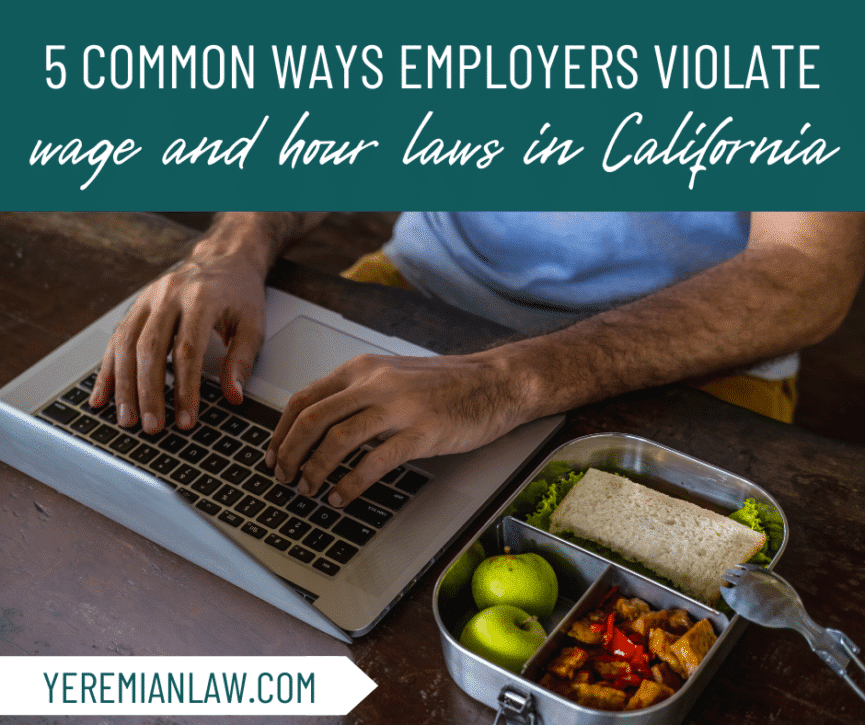Employers are supposed to follow wage and hour laws in the state of California. However, this guide outlines five ways employers often violate them.
5 Common Ways Employers Violate Wage and Hour Laws in California
If you’re like most people, you know that employers are supposed to stick to the law when it comes to paying employees and giving them legally mandated breaks. However, you probably also know that many employers make mistakes or willfully violate laws in an attempt to boost their own bottom lines. Check out these five common ways employers violate California wage and hour laws:
- Misclassifying employees
- Skimping on overtime
- Failing to relieve employees from duty during breaks
- Failing to pay minimum wage
- Failing to pay people’s final paychecks on time
Here’s a closer look at each.
Wage and Hour Violation #1: Misclassifying Employees
Salary misclassification is a pretty big problem in California. It occurs when an employer classifies a worker as an independent contractor when that worker should be considered an employee, or when an employer classifies a worker as exempt from overtime protections when that employee is actually entitled to them. In some cases, it’s an honest mistake; In others, employers do it on purpose to save money.
Independent Contractors vs. Employees
A person may be an independent contractor if they generally perform their work free from the control and direction of the employer, when they provide labor or services that are outside the employer’s usual course of business, and when they are engaged in an independently established occupation, trade or business and perform that type of work for the employer.
On the other side of the coin, employees generally work under the control of the employer, when and where the employer says to work, and performing services that are essential to the employer’s business.
Related: Independent contractor wage and hour claims
Wage and Hour Violation #2: Skimping on Overtime
In the state of California, employers are required to pay overtime wages when an employee works over a certain number of hours in a day or week. The following table outlines overtime pay requirements.
| Hours Worked | Pay Rate |
| 8 or more in one day | 1.5 times the worker’s normal hourly rate |
| 40 or more in one workweek | 1.5 times the worker’s normal hourly rate |
| 7th consecutive day in one workweek | 1.5 times the worker’s normal hourly rate |
| 12 or more per day | 2 times the worker’s normal hourly rate |
| Over 8 hours on the 7th consecutive day in a workweek | 2 times the worker’s normal hourly rate |
Wage and Hour Violation #3: Failing to Relieve Employees From Duty During Breaks
Nonexempt employees are entitled to break times during which they are relieved from all work duties. That goes for rest breaks, lactation accommodations and lunch breaks.
The following table outlines shift lengths and break lengths that are required under California law.
| Shift Length | Break Length |
| 3.5 to 6 hours | One 10-minute rest break |
| 5 to 10 hours | One 30-minute meal break |
| 6 to 10 hours | Two 10-minute rest breaks |
| 10 hours or more | Two 30-minute meal breaks |
Related: How many hours can an employee work in California without a break?
Wage and Hour Violation #4: Failing to Pay Minimum Wage
The state of California has very specific, very clear minimum wage laws. In fact, California’s minimum wage is higher than the federal minimum wage, and employers in this state are not allowed to pay you less than the California wage. In this case, California law supersedes federal law.
However, sometimes employers attempt to pay people less than minimum wage. but the law is very clear: Employers are never allowed to pay you less than state or locality minimum wage (whichever is higher), regardless of any agreement (verbal or otherwise) you have entered into.
It’s important to note that your immigration status has nothing to do with your right to earn minimum wage. No matter what an employer tells you, you are entitled to at least state or a local minimum wage, regardless of your immigration status (even if you are undocumented).
Wage and Hour Violation #5: Failing to Pay People’s Final Paychecks On Time
Employers must follow specific timelines when giving employees their final paychecks. Generally speaking, a worker who has been terminated must be paid all their unpaid wages on the same day they are terminated (though there are a few exceptions to this rule). Employees who quit and provide at least 72 hours of notice before their last day of work must be paid their final wages on their last day (according to their notice); employees who quit without giving notice must be paid their final wages within 72 hours of their last day of work.
Do You Need to Talk to an Attorney About an Employer Violating Wage and Hour Laws?
If you believe your employer has violated wage and hour laws, you may want to speak to an attorney who can help you determine what type of recourse you have. Call our office at 818-230-8380 or fill out the form below to schedule your free consultation with the Los Angeles and Glendale workplace rights attorney. We’ll be happy to answer your questions and give you the guidance you need to begin moving forward.




